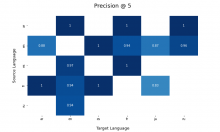User Details
- User Since
- Mar 31 2021, 5:59 AM (159 w, 2 h)
- Availability
- Available
- LDAP User
- Unknown
- MediaWiki User
- MunizaA [ Global Accounts ]
Mar 11 2024
@kevinbazira this is very helpful, thank you!
Jan 18 2024
Nov 16 2023
Knowledge Integrity v0.5.0 has been released which now depends on xgboost 2.x. Upgrading xgboost also required serializing the classifier with the new version so the version for RevertRiskModel has also been bumped to v3. I've shared the model file with @achou. The SHA512 sum for RevertRiskModel v3 is:
fb6d76b105b7e8198cee47f779c69f1bd85be61075061665bdd0811e8d52e1d4f793dacb4a00fc3776ace8c518f1fa5f653879cec81777854cf235b0483156e7 *revert_risk_language_agnostic_model_v3.pkl
Going to resolve this now but please feel free to reopen if something does not look right!
Nov 8 2023
Hi, I've opened an MR for dropping support for Python 3.7 in KI since this was already on the roadmap after its EOL in June 2023 and it also helps support this change (xgboost 2.x requires minimum Python 3.8).
Oct 31 2023
@diego, looking at the revisions in this project I see that the wiki_db is wikidatawiki when it should be wikidata. Can you try fixing the wiki and importing again?
Oct 16 2023
Oct 2 2023
Sep 29 2023
Sep 27 2023
Sep 26 2023
@diego, it's possible I'm missing something but while updating these constants I noticed that the values for be-x-old and be-tarask are different and according to the information here, the former redirects to the latter. be-tarask is one of the new wikis that we're adding these values for, so I wanted to check with you if this is okay. Thanks!
Sep 25 2023
Sep 5 2023
Aug 30 2023
Hi @Miriam, I'll need some more time to work on this. I did some initial exploration here but then had to pause to work on Annotool bug fixes and improvements, which is the tool currently being used to collect annotations for this model. Thank you!
Aug 21 2023
Aug 14 2023
Hi @wolfgang8741, I deployed a patch Friday that fixes this but if you're still running into it, please let me know. Thanks!
Hi @Danny_Benjafield_WMDE, thanks for the feedback!
Jul 28 2023
I rewrote some parts of RRML earlier this week to replace StructuredEditTypes with SimpleEditTypes in this MR, using pointers from your comments above. The changes are still being tested by @Trokhymovych, the original author of this code, to make sure there isn't a significant drift in the predictions made by the model
Jul 21 2023
I managed to separate the headers from sections in the code so it's much cleaner now and seems to run fine for your list of revisions with timeout set to True.
@Isaac that's awesome, thank you!
Jul 14 2023
@Isaac thanks so much for the pointers! It seems like this model is also using node edit info for some of the features but in any case, we should be able to simplify the text diffing code using functionality from mwedittypes.
Hi @elukey, the dependency contraint we have for mwedittypes in KI is "1.2.1" so unfortunately this new version is not a drop-in replacement. There are some minor API changes but more importantly, the diff processing code in get_edit_info will have to be modified in order to adapt to this new version. I can look into making these modifications but looking at the changelog for mwedittypes, it seems like there have also been some changes to how certain types of edits are captured since v1.2.1 and I'm not sure how this would impact the performance of the model so I'm discussing these changes with @Trokhymovych and will make the switch as soon as we're sure about its impact.
Feb 22 2023
Jan 24 2023
@xcollazo I think the reason why Spark2 does not push this filter down is because it does not infer filters from generators as the optimizer rule InferFiltersFromGenerate in Spark 3.1.2 does not seem to exist in Spark 2.4.4
Jan 20 2023
I looked into this a little because I wasn't sure why Spark was pushing down the parse UDF. Looking at the query plan for Spark 3, I think what's happening is that because the job does an explode on the UDF's result, Spark pushes down the UDF to filter out any rows with nulls or empty arrays early:
Dec 19 2022
Dec 5 2022
This is also related to T323023 but could it be that since we're sharing a client session between requests, the host header is not getting updated correctly? Maybe we should also log successful request responses to see that we're getting the right language back? For example, all of the above revisions exist in de wikipedia except for the en ones and if I query for those I get 'badrevids'.
Nov 2 2022
Thanks a lot for sharing these results here, @achou! I do see that we're seeing more socket connect errors with increased connections. Is that something we should be concerned about? Wrk docs don't seem to say anything about these errors but some issues on the repo mention that connect errors in particular can also occur when wrk runs out of file descriptors but they also report opening hundreds of connections so not sure if that's the case here.
Aug 4 2022
Apr 26 2022
Apr 3 2022
The following results include the top 100 language pairs by number of section pairs tested. The precision here denotes the probability that, of all the aligned target sections for a source section in our extracted data, the cx dataset translation was among the top 5. Please note that any source sections occurring more than once per (source language, target language) in the cx dataset were counted as one pair and tested by checking if any of the corresponding targets ended up among the top 5.
Jan 12 2022
In order to assess the accuracy of our current language model, we tried to replicate the experiment that @diego had run with the FastText embeddings. This involved training a classifier on a portion of the ground truth and then using it to predict the similarity of the remaining section pairs in the ground truth. More specifically, we took our previously generated set of all possible section pairs for the 6 languages used in this experiment and for each pair extracted a bunch of features that describe that pair (the number of times the two sections in it occur together, how similar the links that they contain are on average etc.) which happen to be a subset of the features that Diego used. We then labelled all pairs that are found in the ground truth as 'True' and the rest as 'False'. A classifier using gradient boosting was trained on a portion of this data and was then used to classify the rest of it. We then dense ranked the results from this classifier to evaluate the probability of a pair from the ground truth ending up in the top 5 (precision @ 5).
The results from this experiment came out to be comparable to the previously documented ones. This means that we can use a multilingual model in place of FastText which is monolingual (meaning that while similar words within a language share similar vectors, translation words from different languages do not do so) eliminating the need to align vectors from two languages in a single vector space before they can be compared and expect similar results.
The following image depicts the results from the experiment mentioned above. Empty boxes in the chart represent cases where we didn't have enough ground truth.
Dec 6 2021
We experimented with multiple pre-trained models from sentence-transformers to find a multilingual model that can accurately and efficiently encode section headings. We've found that paraphrase-xlm-r-multilingual-v1 provides the most accurate and consistent results across multiple languages for our use case. It maps sentences to a 768 dimensional shared vector space and the resulting vectors can then be used to calculate cosine similarity between co-occurring sections.
The following results were obtained by running the same model evaluation experiments for different language pairs. We evaluate models by first aligning articles in two languages using their wikidata id. We then take the sections from those aligned articles and generate all possible combinations. The selected model is then used to encode these section pairs and calculate their similarity. We then rank these pairs by similarity for each section and check the rank of the true section translation (the one that's in our dataset). Note that these results only contain language pairs for which we had more than 20 records in our dataset.
Oct 13 2021
@CDanis I've signed it now. Thanks!

